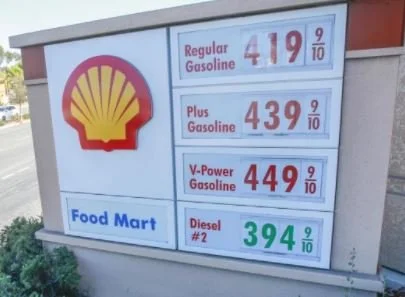Energy & Economics
Midway through the market on Sunday my phone started chirping from ALERT MONTGOMERY with Severe Traffic Alerts due to demonstration activity. Oh no, not again. I made the mistake on Friday of running errands near Hagerstown and got caught up in Freedom Convoy traffic. So when I rolled out of the market on Sunday I turned on Waze and braced myself for a longer drive home. Fortunately, the only slow traffic was due to a few convoy participants broken down on the side of the road and at one overpass where it appeared as if someone was tossing glitter from overhead, but other than that the drive home was the usual speedway.
When I stopped to fuel up, however, I ran into a few of the convoy participants at the pumps. They were howling mad at the cost of fuel, griping, and squawking to everyone within earshot. “The damn president needs to open the Keystone XL pipeline and allow more drilling,” the man at the adjacent pump screamed at me while I watched the cost of my own weekly trip to market double.
“The president and the pipeline have absolutely no impact on the price of gasoline,” I said shaking my head at the man’s ignorance.
“F#%king libtard, what do you know. You drive a Honda. Buy American,” he wailed before speeding out in his monster truck festooned with assorted flags of dissent.
Here’s what I do know: my van was manufactured in Lincoln, Alabama and getting oil out of the ground and into that van is not any easy process.
Not all of us have been farmers for the entirety of our working life. For some, like myself, it’s been a new career path altogether; the fruition of a long-sought goal. While my parents joked, so much for her college education, my previous vocations have given me a solid foundation upon which I’ve built farm life, none more so than when I worked in the petroleum industry, specifically on offshore drilling rigs. It gave me a ringside education about exactly what it takes to get crude oil out of the ground and into the tank.
The principles of economics apply to everything from eggs to energy although hydrocarbons aren’t perishable. When the demand for a salable item drops, production is reduced or even eliminated. When demand is reduced, so is the cost. Why? Storage is expensive. It doesn’t matter if it’s a walk-in freezer or a tank farm, storage facilities cost money to maintain and can’t be spun up overnight. So when all of the world goes on a pandemic lockdown with few commuting and few traveling, there’s going to be a glut of gasoline meaning the price will drop. At the height of lockdowns my weekly trip to market was less than twenty bucks. Last week it went over fifty.
We can try to blame it on politics, both domestic and international, but as Pogo once wisely said, We have met the enemy and he is us. A year after the widespread rollout of vaccines, we’re back on the road and at the office. Each week more customers are telling me of their travels when for the last few years they’ve hung out at home. Everyone seems to be traveling and those planes, trains, and automobiles don’t run on without fuel.
In a way, producing oil is a lot like farming—it doesn’t happen overnight. Not only is there a significant investment in money for leases/land, but also to build the requisite infrastructure before any production can begin. An oil well isn’t like a water tap that can be turned off and on at will. You don’t turn off milk cows or laying hens either. When there’s a glut, like early in the pandemic when kids weren’t in school and restaurants were closed, commodity farmers who sold to those market segments were giving away milk and eggs for free because there were no customers. Similar circumstances apply to processing. Remember how hog and chicken farmers were depopulating by the thousands and bulldozing into large pits because they had no access to processing when over twenty major slaughter facilities were closed down due to COVID19? A lot of oil wells in this country have had the misfortune of not being able to produce again once shut down. When they’re shut in, they’re out of production for good. At least pork and chicken began showing up again at the grocery stores after the shelves went bare due to supply chain issues.
We’re at a junction where energy companies are hesitant to invest in costly new wells when renewable energy technologies are on the rise. Gas guzzling drivers are demanding more wells be drilled, but the energy companies are having none of it. They hold and maintain thousands of unused leases that could be developed but aren’t due to economic conditions. Anyone who has ever maintained a lease knows they’re not free. Somewhere someone is making a business decision based upon supply, demand, and profitability.
Just as most people have little to no idea about where their food comes from or how it was produced, they have even less knowledge of the fuel they used to heat their homes, power their cars, and drive just about every aspect of the economy. Life in the oil patch is dirty, hard, and dangerous—like farming. In farming, we have seasons and crops. In petroleum, there’s drilling and production. Did you know that most wells are drilled in less than 30 days with crews moving the drilling rig from site to site? It’s like using a tractor to till different fields. On an offshore platform the rig is moved to a new hole, some platforms having as many a hundred different wells supported by a single platform, like a farmer growing multiple crops on the same farm.
And don’t get me started on the whole pipeline issue. That would be like getting mad at Mitch when a vendor raises their prices, demanding more vendors be brought in so the prices drop. We’re rapidly approaching fruit season and anyone whose shopped at market long enough knows the first few weeks of berry season you’re going to stand in line and pay a premium until the glut kicks in.
Here’s the truth: farmers depend on fuel to get food from our fields to your tables. No matter how much we try to reduce our energy usage, be it driving fuel efficient vehicles to switching over the farm to solar, the price of your food will always be tied to the costs of energy. Believe me, when Honda or Toyota puts an electric minivan on the market, I’ll be first in line.
Some days I wonder if basic economics are still taught in school given the level of ignorance about it. My fuel pump didn’t spit out a receipt and I had to go into the store to get one. There I stood behind another customer complaining about how the current administration is impinging on our personal freedoms with the rising fuel costs, but they didn’t bat an eye forking over nearly sixty bucks for a carton of Marlboro’s.

